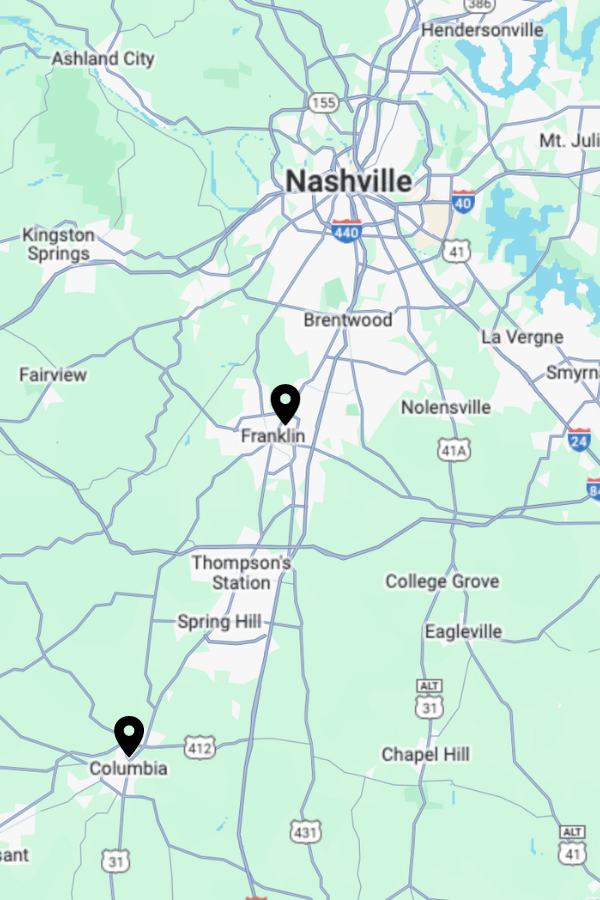Apex Recovery, located in Tennessee, specializes in drug and alcohol addiction rehabilitation and mental health treatment. We offer comprehensive services designed to support you on your journey to recovery, utilizing evidence-based practices and personalized care to handle the distinctive needs of each client and inspire long-term wellness and sobriety.
Apex Addiction Recovery Center provides same-day assessments and can quickly verify your insurance for immediate admissions. This ensures that those seeking help for drug and alcohol addiction or mental health issues receive prompt and efficient access to the care they need, facilitating a smoother and faster entry into our recovery programs.

What is a Suboxone Medication?
Suboxone is a prescription medication used to treat opioid addiction. It contains two active ingredients: buprenorphine and naloxone. Buprenorphine is a partial opioid agonist that helps to reduce cravings and opioid withdrawal symptoms without producing the intense highs associated with full opioids. Naloxone, an opioid antagonist, blocks the effects of opioids if the medication is tampered with or injected.
Suboxone is typically administered as a sublingual medication film or tablet that dissolves under the tongue. It is an integral part of Medication-Assisted Treatment (MAT), combining medication with counseling and behavioral therapies. This approach supports a holistic recovery process by addressing the physical and psychological aspects of addiction, aiding you in achieving long-term sobriety.
What is Suboxone Used For?
Suboxone is primarily used for the treatment of opioid addiction. It helps you reduce or quit your use of heroin or other opiates, such as morphine or oxycodone. The medication combines buprenorphine, which alleviates withdrawal symptoms and cravings, with naloxone, which prevents misuse by halting the effects of opioids if injected.
Suboxone is a key component of Medication-Assisted Treatment (MAT), which combines medication with counseling and behavioral therapies. This comprehensive approach supports you in managing your addiction, reducing the risk of relapse, and achieving sustained recovery. By stabilizing brain chemistry and mitigating withdrawal, Suboxone helps in the opioid recovery process, allowing you to focus on rehabilitation and long-term health.
Free Addiction Assessment
Schedule a free, confidential assessment with a licensed clinician. Apex Recovery can check your insurance coverage levels for drug and alcohol addiction, and mental health treatment.
How Does Suboxone Medication Treatment Work?
Suboxone treatment involves the combination of two medications: buprenorphine and naloxone. Buprenorphine, a partial opioid agonist, binds to the brain’s opioid receptors, helping to reduce cravings and withdrawal symptoms without causing intense highs. Naloxone, an opioid antagonist, hinders opioid effects and is included to prevent misuse.
When taken as prescribed, Suboxone alleviates withdrawal symptoms and cravings, stabilizing brain chemistry. Suboxone is most effective when used as part of a comprehensive MAT program, which includes counseling and behavioral therapies to address the psychological aspects of addiction and support long-term recovery.
Statistics on Suboxone Use in Tennessee for Addiction Treatment
In 2002, the Federal Drug Administration (FDA) greenlit buprenorphine for treating opioid use disorder. Fast forward to 2015, the Addiction Treatment Act in Tennessee tightened buprenorphine prescription regulations, reserving it for those with opioid use disorder. This move, coupled with enhanced naloxone access, aimed to curb opioid-related harm.
In 2020, Tennessee broadened prescribing authority to nurse practitioners and physician assistants, bolstering treatment accessibility. By then, the state boasted 1,007 DATA-waivered practitioners, with Davidson County leading at 216. In 2019, 231,848 buprenorphine prescriptions were dispensed across Tennessee through 90 facilities, with 28.8% incorporating Suboxone into Medication-Assisted Treatment (MAT). Although 55 fatal opioid-related overdoses involved buprenorphine, they often co-occurred with other potent substances, underscoring the complexity of addiction.

- Please complete and send the form below.
- One of our staff members will contact your insurer to check your coverage.
- We will contact you promptly with the results and to discuss the next steps.
Insurance Verification
"*" indicates required fields
Suboxone Medication Treatment Centers in Tennessee
Apex Drug and Alcohol Addiction Recovery Center has multiple facilities across Tennessee, providing specialized Suboxone treatment near me for opioid addiction. Our locations offer comprehensive care to support recovery and long-term sobriety. We have one facility in Franklin and two locations in Columbia.
Each facility is equipped to deliver personalized maintenance treatment plans, integrating medication with counseling and behavioral therapies to address both the physical and psychological aspects of addiction.
Apex Recovery Franklin
4601 Carothers Pkwy STE 250A
Franklin, TN 37067
Apex Recovery Columbia
2710 Trotwood Ave STE A & B
Columbia, TN 38401
How To Find a Suboxone Clinic or Doctor Near Me
Finding a Suboxone clinic near me or a doctor in TN is essential for those seeking Medication-Assisted Treatment (MAT) for opioid addiction. Here’s a guide to locating a Suboxone clinic in the Volunteer state or Suboxone doctors near me in TN, particularly in major cities like Nashville and Memphis:
- Check with Your Health Insurance Provider: Start by contacting your health insurance provider. They often have a list of in-network Suboxone doctors near me accepting new patients, ensuring your treatment will be covered.
- Consult with Healthcare Professionals: Seek recommendations from your primary care physician, psychiatrist, or addiction counselor. These professionals typically have connections with Suboxone providers and can refer you to reliable clinics.
- Contact Local Hospitals and Health Centers: Many hospitals and community health centers in Tennessee provide addiction treatment services or can direct you to nearby Suboxone clinics. Reach out to hospitals in major cities for more information.
- Explore Local Addiction Support Groups: Organizations like Narcotics Anonymous (NA) and other addiction recovery groups can provide information about local Suboxone clinics and doctors. These groups also offer valuable support during recovery.
- Check with State and Local Agencies: Tennessee’s Department of Mental Health and Substance Abuse Services (TDMHSAS) can offer information on addiction treatment resources. Contact them to locate Suboxone clinics in Nashville and Memphis.
- Use Social Media and Online Forums: Search social media platforms and online forums dedicated to addiction recovery. Community members often share their experiences and suggest clinics and doctors.
- Verify Credentials and Experience: Be sure potential clinics or doctors are licensed to prescribe Suboxone and have the necessary experience in treating opioid addiction. Search for board-certified addiction specialists or doctors with a DATA 2000 waiver.
- Schedule a Consultation: Arrange a meeting with the facility, like Apex Alcohol and Drug Addiction Recovery Center, to discuss your treatment options and ensure they meet your needs.
By following these steps, you can find same-day treatment centers, such as Apex Addiction Recovery Center in Tennessee, that will help you on your journey toward recovery. Contact us or call us at (877) 881-2689 today.

Does Health Insurance Cover Suboxone Treatment?
Yes, health insurance often covers Suboxone treatment as part of Medication-Assisted Treatment for opioid addiction. Most insurance plans, including Medicaid and private insurers, recognize the effectiveness of MAT and include coverage for Suboxone prescriptions and related medical services. However, coverage specifics can vary, so it is important to check your insurance to understand the details of your plan.
This process includes verifying in-network providers, co-pays, and any prior authorization requirements. Ensuring that Suboxone treatment is covered under your insurance can significantly reduce out-of-pocket costs and make the recovery process more accessible and affordable. Reach out to us at Apex Substance Addiction Recovery Center to go over your insurance details.
How Much Does Suboxone Treatment Cost Without Insurance in Tennessee?
The cost of Suboxone treatment without insurance in Tennessee can fluctuate depending on several factors, including the Suboxone dosage prescribed, frequency of appointments, and additional services provided by the clinic or doctor. On average, the monthly cost of Suboxone medication ranges from $100 to $500.
However, this does not include the cost of doctor visits, counseling sessions, or other related expenses. Without insurance coverage, you may also need to pay for lab tests, Suboxone therapy sessions, and other medical services out of pocket. Some clinics, like Apex Addiction Recovery Center, offer sliding scale fees or financial assistance programs to help make treatment more affordable for those without insurance.

Types of Substance Addiction Treated with Suboxone Medication
Suboxone medication is utilized in treating various types of substance addiction. Some of the primary addictions targeted include synthetic opioid addiction rehab, prescription opioid addiction rehab, and heroin addiction rehab. These medications, in combination with counseling and behavioral therapies, offer effective treatment options for people struggling with opioid dependence. Note: this is not a full list.
Synthetic Opioid Addiction Rehab
Synthetic opioid addiction rehab focuses on addressing dependence on synthetic opioids like fentanyl, tramadol, and methadone. These powerful substances can lead to severe addiction and pose significant health risks. Treatment often involves a combination of Suboxone medication, counseling, harm reduction, and behavioral therapies.
Suboxone helps alleviate withdrawal symptoms and cravings, while therapy addresses underlying psychological factors contributing to addiction. Additionally, medical supervision ensures safe detoxification and ongoing support throughout the recovery process. Synthetic opioid addiction rehab aims to empower you to overcome your dependence, regain control of your life, and achieve long-term sobriety.
Prescription Opioid Addiction Rehab
Prescription opioid addiction rehab targets people struggling with dependence on prescription pain medications such as oxycodone, hydrocodone, and morphine. These medications, while initially prescribed for legitimate pain management, can lead to addiction when misused or taken in high doses. Treatment for prescription opioid addiction often includes Suboxone medication to alleviate withdrawal symptoms and cravings.
Additionally, therapy and counseling help you address underlying issues contributing to your addiction and develop coping strategies for managing cravings and triggers. Prescription opioid addiction rehab provides comprehensive support and guidance to people seeking to overcome their dependence and achieve lasting sobriety.
Heroin Addiction Rehab
Heroin addiction rehab is designed to tackle the challenges faced by those struggling with dependence on heroin, a potent and highly addictive opioid. Treatment typically involves a combination of Suboxone medication, counseling, and behavioral therapies. Suboxone helps manage withdrawal symptoms and cravings, facilitating a smoother detoxification process.
Counseling and therapy sessions provide crucial support in addressing underlying psychological factors contributing to addiction and developing coping mechanisms for relapse prevention. Medical supervision ensures safe detoxification and ongoing monitoring of progress. Heroin addiction rehab aims to empower you to break free from the cycle of addiction and achieve sustained wellness.

Suboxone vs. Methadone: Understanding the Differences
In the debate of Suboxone vs. methadone, both medications are used in Medication-Assisted Treatment (MAT) for opioid addiction, but they have key differences. Suboxone contains buprenorphine and naloxone, while methadone is a full opioid agonist. Suboxone’s partial agonist properties make it less likely to cause euphoria and overdose compared to methadone.
Additionally, Suboxone can be prescribed by qualified physicians in an office setting, while methadone typically requires daily visits to specialized clinics. Suboxone is also less likely to lead to physical dependence and withdrawal symptoms upon cessation. However, both medications effectively reduce cravings and withdrawal symptoms, providing crucial support in opioid addiction recovery.
Suboxone vs. Subutex: Understanding the Differences
Meanwhile, with Subutex vs Suboxone: both medications are used in Medication-Assisted Treatment for opioid addiction, but they have significant distinctions. Suboxone contains both buprenorphine and naloxone, while Subutex contains only buprenorphine. Naloxone is added to Suboxone to deter misuse by blocking the effects of opioids if injected. Suboxone’s combination reduces the risk of abuse and overdose compared to Subutex.
Additionally, Suboxone is often preferred for initial treatment due to its decreased abuse potential. However, Subutex may be prescribed in certain situations, such as during pregnancy, when naloxone is contraindicated. Both medications effectively alleviate withdrawal symptoms and cravings, aiding you in your recovery from opioid addiction.
Other Medications Similar to Suboxone
In addition to Suboxone, there are several other medications similar in composition and purpose(this list is not exhaustive). These include Zubsolv, Bunavail, and formulations containing buprenorphine/naloxone. These medications, like Suboxone, are used in Medication-Assisted Treatment to manage opioid addiction by reducing cravings and withdrawal symptoms while minimizing the risk of misuse and overdose.
Zubsolv
Zubsolv is a medication used in Medication-Assisted Treatment for opioid addiction. Similar to Suboxone, it contains buprenorphine and naloxone. Zubsolv is available as a sublingual tablet that dissolves under the tongue. It works by reducing cravings and withdrawal symptoms associated with opioid dependence. Zubsolv is prescribed by qualified healthcare providers as part of a comprehensive treatment plan for addiction recovery.
Bunavail
Bunavail is a medication utilized in MAT for opioid addiction. Like Suboxone, it combines buprenorphine and naloxone. However, Bunavail is available as a buccal film, which is placed inside the cheek to dissolve. This formulation offers an alternative delivery method for people undergoing addiction treatment, helping to alleviate cravings and withdrawal symptoms associated with opioid dependence.
Buprenorphine/Naloxone
Buprenorphine/Naloxone is a combination medication used in Medication-Assisted Treatment for opioid addiction. It combines buprenorphine, a partial opioid agonist, with naloxone, an opioid antagonist. This combination helps reduce cravings and withdrawal symptoms while deterring misuse by blocking the effects of opioids. Buprenorphine/Naloxone is prescribed by qualified healthcare providers as part of a comprehensive treatment plan for addiction recovery.
Get in Touch with Apex Recovery Center Tennessee
Unlock the door to recovery with Apex Addiction Recovery Center in Tennessee, in the heart of the Volunteer State. Our dedicated team is here to guide you through every step of your journey. Amidst the majesty of the Great Smoky Mountains and the soothing melodies of country music, let us be your steadfast companions on the path to sobriety.
Recover with us, from Chattanooga to Knoxville, along the iconic Tennessee River to the legendary tunes echoing from Music City’s Grand Ole Opry and Beale Street’s vibrant nightlife. With our support, explore the cultural heritage of Elvis Presley’s Graceland, the adrenaline of a Tennessee Titans game, or the intellectual fervor of Vanderbilt University and the University of Tennessee. Delve into the history of the Blue Ridge Mountains and Civil War history sites, or savor the flavors of Tennessee whiskey at Dollywood. No matter your journey, our compassionate care awaits. Contact us or call us at (877) 881-2689 today and let us help you reclaim your life.
Who Can Prescribe Suboxone in Tennessee?
In Tennessee, Suboxone can be prescribed by various healthcare providers, including opioid addiction treatment centers, physicians (both medical doctors and doctors of osteopathy), nurse practitioners (NPs), and physician assistants (PAs). These qualified professionals play crucial roles in providing Medication-Assisted Treatment and supporting patients on their journey to recovery from opioid addiction. Please note this is not a full list.
Opioid Addiction Treatment Centers
Opioid addiction treatment centers are specialized facilities that offer comprehensive care and support for those struggling with opioid addiction. These centers provide a range of services, including medical assessment, medication management (such as Suboxone treatment), counseling, and therapy. Opioid addiction treatment centers play a vital role in helping people achieve recovery and long-term sobriety.
Physicians (Medical doctors and doctors of osteopathy)
Physicians, including medical doctors (MDs) and doctors of osteopathy (DOs), are licensed healthcare professionals authorized to prescribe Suboxone for opioid addiction treatment in Tennessee. With their medical expertise and training, physicians play a crucial role in assessing patients, determining appropriate treatment plans, and monitoring their progress throughout the recovery process.
Nurse Practitioners (NPs)
Nurse Practitioners (NPs) are advanced practice registered nurses (APRNs) who are authorized to prescribe Suboxone for opioid addiction treatment in Tennessee. With their specialized training and clinical experience, NPs play an essential role in providing comprehensive care to people struggling with opioid dependence. They collaborate with patients to develop personalized treatment plans and offer ongoing support throughout their recovery journey.
Physician Assistants (PAs)
Physician Assistants (PAs) are healthcare professionals licensed to practice medicine under the supervision of physicians. In Tennessee, PAs are authorized to prescribe Suboxone for opioid addiction treatment. With their medical training and expertise, PAs collaborate with physicians to provide comprehensive care, including assessment, medication management, and ongoing support, to people seeking recovery from opioid dependence.

Suboxone Related Statistics in Tennessee
- The Federal Drug Administration (FDA) approved the use of buprenorphine in the treatment of opioid use disorder in 2002
- In 2015, the Addiction Treatment Act was passed in Tennessee, which restricted the prescription of buprenorphine to only those with opioid use disorder, set the initial prescribing guidelines for buprenorphine, and increased access to naloxone across Tennessee.
- In 2020, Tennessee expanded mid-level providers’ scope of practice allowing nurse practitioners and physician’s assistants to prescribe buprenorphine with restriction
- In 2020, TN had 1,007 DATA-waivered practitioners
- Davidson County has the highest number of providers with 216 DATA waivered physicians
- 231,848 buprenorphine prescriptions were filled in 2019 in TN
- 90 facilities in Tennessee offered Suboxone in 2019
- 28.8% of state facilities used Suboxone as part of MAT
- In one study, of 2,369 fatal opioid-involved overdoses analyzed, 55 involved buprenorphine
- In nearly all cases it was accompanied by other potent substances that more frequently cause fatal overdoses on their own
Sources: tn.gov
samhsa.gov
nih.gov

